Step 8: The Christian and Giving
God’s Ownership Over All
As Christian stewards we must realize that in Christ “we live and move and have our being” (Acts 17:28). In this lesson, you will see the basis of God’s claim on your life. Jesus Christ created us (Colossians 1:16). He bought us with His precious blood (1 Peter 1:18,19). And God anointed Him as our Lord (Ephesians 1:20-23; Acts 10:36; Romans 10:12). Thus, the whole of our life – our personality, influence, material substance, everything – is His, even our success.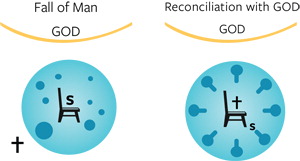 The Bible tells us that since Christ died for us, “those who live should no longer live for themselves but for him who died for them and was raised again” (2 Corinthians 5:15). Not to acknowledge and act upon God’s total ownership of everything we are, have, and will be is to rob ourselves of His blessing and make ourselves unfit for His service (2 Timothy 2:15,16,19-21). Creation and Fall of Man
The Bible tells us that since Christ died for us, “those who live should no longer live for themselves but for him who died for them and was raised again” (2 Corinthians 5:15). Not to acknowledge and act upon God’s total ownership of everything we are, have, and will be is to rob ourselves of His blessing and make ourselves unfit for His service (2 Timothy 2:15,16,19-21). Creation and Fall of Man
- After what pattern did God create man? (Genesis 1:26)
- Theologians have long debated just what it is that constitutes the image of God. That image seems to include the basic characteristics of personality; intellect, emotion, and will. Adam and Eve had intellect (Genesis 2:19), emotion (3:10), and will (3:6), just as God does.What did man do to bring about separation between himself and God? (Genesis 3:1-7)Note: This passage gives important insight into the character of sin. Adam did not get drunk, or commit immoral acts. He and Eve merely asserted their independence from God, rebelled against His command, and took control of their own lives. Sin is being independent of God and running your own life.
- How did the sin of man affect his: intellect (II Corinthians 4:2-4), emotions (Jeremiah 17:9), and will (Romans 6:20)?
- How did this act of rebellion affect the world? (Romans 5:12)
- How did God bring us back and reconcile us to Himself? (Romans 5:8-10)
- What has God given us to enable us to live for Him? (John 14:26)
- God now has restored us to a position of fellowship similar to what Adam had. What does that declare about our present relationship with God? (I Corinthians 6:19-20)
- What, then, is to be our response to God? (Romans 12:1-2)
- Many people attempt to compromise and give God less than full allegiance. How did Jesus regard that practice in Matthew 12:30?
- In Revelation 3:15-16, how did Jesus describe His attitude toward those who will stand neither for nor against Him?
- What logical choice did Elijah present to the people? (I Kings 18:21)If Elijah’s logic is true, we must take one of two positions. If we determine that Jesus Christ is Lord and God, we must serve Him loyally. If He is not, He is an imposter and Christianity is obviously a hoax. If this were true, we should dissuade men from being Christians. It is one or the other! We must stand either with Christ or against Him, but never try to stand in between.
- Read Isaiah 48:17-19. What blessings would you lose by going your own way and failing to recognize God’s ownership?
- How much of your life are you willing for God to control? How much of it does He control?
- Is there something in your life that you have not surrendered to the control of your heavenly Father? What is it, and how will you now deal with it?
- What do you think God will do with your life if you surrender it all to Him?
Examples of Perfect Giving
Giving began with God. His supernatural expression of giving was in the sacrifice of his only begotten Son that we might receive forgiveness for our sins, become children of God, and enjoy eternal life. God continues to give of Himself today in love, forgiveness, peace, power, and purpose. By this He enables us to live full, meaningful lives. Giving was the lifestyle of our Lord Jesus. A concise description of his lifestyle appears in the Book of Acts, which records, “He went around doing good” (Acts 10:38). Jesus gave in feeding the multitudes. He gave in healing the sick. He gave in teaching His disciples. He gave in empowering His disciples for evangelism. He gave in compassion for the poor. He gave in offering rest to the weary. He gave in dying on the cross for our sins. He gave in sending His Holy Spirit.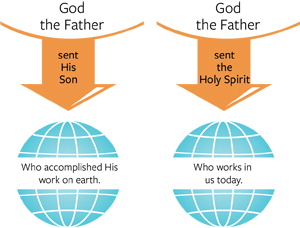 Giving is also an attribute of the Holy Spirit. He strengthens and encourages us (Acts 9:31), renews us (Titus 3:5), reveals things to us (Luke 2:26), and helps us (John 14:6, NASB). He leads and guides us (Luke 4:1; Acts 13:2,4; John 16:13), brings the love of God to us (Romans 5:5), teaches us (Luke 12:12; John 14:26), and empowers us (Acts 1:8; 4:31). Nowhere can we find more perfect models of stewardship than in God the Father, God the Son, and God the Holy Spirit. As you study this lesson, prayerfully consider how you can apply their examples to your life. Stewardship of God the Father
Giving is also an attribute of the Holy Spirit. He strengthens and encourages us (Acts 9:31), renews us (Titus 3:5), reveals things to us (Luke 2:26), and helps us (John 14:6, NASB). He leads and guides us (Luke 4:1; Acts 13:2,4; John 16:13), brings the love of God to us (Romans 5:5), teaches us (Luke 12:12; John 14:26), and empowers us (Acts 1:8; 4:31). Nowhere can we find more perfect models of stewardship than in God the Father, God the Son, and God the Holy Spirit. As you study this lesson, prayerfully consider how you can apply their examples to your life. Stewardship of God the Father
- Read John 3:16. What was God’s greatest gift to mankind?
- What else does God give us? (Romans 2:4,7 & I John 5:11)
- Read John 3:34, 10:10, and 14:16. What has the Father given us to enable us to live abundantly?
- List some characteristics of God’s nature that make giving a priority with Him.
- List the acts of Christ that indicate perfection in His stewardship. (Philippians 2:5-8)
- What was Christ’s supreme purpose in life? John 6:38 & Hebrews 10:7
- Read John 12:23-33. As part of God’s will for Jesus, what was involved? In verse 24, Jesus used the example of a grain of wheat that is planted in the Earth. In what sense does a grain of wheat have to “die” to bring forth fruit? How does this apply to us? (Compare verse 25.)
- If as a Christian, you are unwilling to make any sacrifice to reach others for Christ, to suffer any hardship, to face any self-denial, to suffer any persecution, but instead want everything to be comfortable, easy, and effortless, how will this affect your fruit-bearing?
- List some characteristics of Christ’s nature that make giving a priority to Him.
- What are some duties the Holy Spirit performs as God’s steward, as revealed in the following verses? John 16:7-11. In what way does this convicting ministry of the Holy Spirit help us in evangelism?
- John 16:13. Note: In a general way, the Holy Spirit guides the believer into spiritual truth. In a specific way, He guided the Apostles and early Christians in proclaiming the truth of the Gospel and in writing the New Testament Scriptures.Also Romans 5:5, 8:14, 16, 26.
- When the Holy Spirit controls a person, who is glorified? John 16:14
- List characteristics of the Holy Spirit’s nature that make giving a priority with Him.
- How does the giving nature of God the Father inspire you to give?
- How can you best apply to your life the example that Jesus set? Be specific.
- What does the Holy Spirit want to do in your life at this time?
- List ways you can cooperate as suggested in Acts 4:31, Ephesians 5:18-20 & Romans 12:1-2.
Stewardship of Our Bodies
Some time ago, my heart grieved as I learned of a respected Christian leader who had fallen into a life of sin. He had obviously not intended to do so, but when the temptation came, he yielded. As a result, his wife, his family, his friends, and fellow Christians suffered heartache. Most tragically, his testimony and witness for the Lord Jesus has suffered untold damage. Many have ridiculed and rejected the cause of Christ because of his sin. Since God wants us to live a holy life, the enemy seeks to entrap us in sin and defeat. One of Satan’s methods is to tempt us to misuse our bodies. But God created our bodies for His glory. By surrendering them to Him, He can use us to further His kingdom and help us grow in our faith.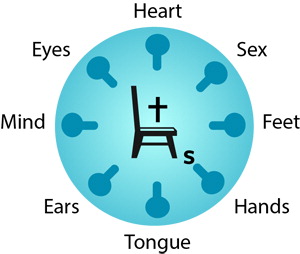 This study will help you understand the importance of giving control of your body to God. You will also discover danger areas in using your physical self and how to help further the cause of Christ with different parts of your body. The Spirit and the Body
This study will help you understand the importance of giving control of your body to God. You will also discover danger areas in using your physical self and how to help further the cause of Christ with different parts of your body. The Spirit and the Body
- Read I Peter 4:1-2 and Hebrews 10:1-10. How did Jesus regard His body?
- What does Christ’s sacrifice mean to us? (Hebrews 10:10) Look up the word “sanctified” in a Bible dictionary. How does this word relate to your stewardship?
- What do you learn about the body of the Christian from Romans 8:8-9 and 12:1?
- Express in your own words the additional reasons given in I Corinthians 6:19-20 for being a good steward of your body.
- How are we to do this? (Galatians 5:16, Romans 12:1, Matthew 26:41)
- Why is it so important to be a good steward of the tongue? (James 1:26 and 3:2-6)
- Why should you know concerning its use? (Matthew 12:36) List areas where you misuse your tongue. How has this affected your life? How should you use your tongue properly? (James 3:9-10, Ephesians 4:24, 29, Proverbs 21:23, Psalm 39:1)
- What must we understand about the heart? (Jeremiah 17:9) How can we counteract our natural tendencies? (Psalm 139:23-24)
- What condition of heart does God require? (Psalm 51:17) What kind of heart does God look for and why? (II Chronicles 16:9, Matthew 5:8, II Thessalonians 3:5, Psalm 15:1-2)
- What is the result of keeping your mind focused on God? (Isaiah 26:3) How can you keep your mind on Him? (Philippians 4:6-7, Deuteronomy 11:18)
- What does God think about the work of your hands? (Proverbs 12:14, 24) How did the apostles feel about the importance of what their hands had done? (Acts 20:34-35 and I Thessalonians 4:11-12)
- How can we use our hands to glorify God? (Proverbs 31:20, Ephesians 5:28, Deuteronomy 15:10-11, Ecclesiastes 9:10)
- Contrast the feet of those who do evil with those who do good. (Isaiah 52:7, 59:7, Romans 3:15, Psalm 119:101,105; 56:13)
- How do Romans 10:15 and Ephesians 6:15 relate to evangelism?
- What is the importance of the eyes (Matthew 6:22-23) Describe what this means to you? What sins can we commit with our eyes? (Proverbs 21:4, 27:20, Jeremiah 22:17, Matthew 5:28, I John 2:16)
- What privilege did the apostles have? (I John 1:1-3) How can we avoid temptation? (Psalm 19:8, 119:37, 121:1-2, 123:1)
- Write down ways we can misuse hearing. (Proverbs 21:13 II Timothy 4:3-4) What can listening to God give us? (Romans 10:17, John 5:24) How can you apply James 1:19-22 to your daily life? Give specific examples.
- Compare the sexual sins in I Corinthians 6:9-10,13-18 with marriage in I Corinthians 7:1-8.
- God considered David a man after His own heart, yet what was David’s greatest sin? (II Samuel 11:2-5; 14-17; 26-27)
- What is God’s stern judgment against misusers and abusers of sex? (I Corinthians 6:9-10) Why is it especially tragic if a Christian becomes involved in the misuse of sex? (I Corinthians 6:15-18)
- How serious is sexual lust, according to Christ? (Matthew 5:28)
- How can the application of the following verses enable you to overcome sexual lust? (Philippians 4:8, Psalm 119:9, 11; I Corinthians 10:13; Romans 6:11-13; I Thessalonians 4:3-5)
- List the things in your life that tempt you to have impure thoughts. How can you apply these verses to each?
- How does stewardship of each individual part of the body affect each part?
- How could it affect the body as a whole?
- How would you apply I Thessalonians 5:22 to the following: The use of your tongue; desires of your heart; control of your mind; work of your hands; where you go; what you see; what you hear; your conduct with members of the opposite sex?
Stewardship of Our Time
Does the principle of tithing apply equally to our time as it does to our money? How much of our time should we set aside for the work of the Lord each week? How are you using the time God has given you? Time is the heritage of every person. Whether a king or street sweeper, an astronomer or truck driver, a business tycoon or grocery clerk, each of us has the same number of hours. Many necessities and opportunities demand much of our day. Our work takes up a large percentage of our life. Being a good husband or wife, father or mother, employer or employee requires time. As Christians, we have spiritual priorities as well. How many hours or days in a month should we set aside for evangelism and discipleship and the ministries of our church? What about caring for the poor, the orphans, and widows as God’s Word commands (James 1:27; Galatians 2:10)? With all these tasks competing for our time, how can we balance our responsibilities to fulfill our temporal and spiritual duties? As a good steward, you must manage your time wisely. Let me suggest a way to accomplish this task that Christians seldom consider today – tithing your time. Tithing reflects a thankful, obedient attitude and acknowledges God as the source and owner of all that we possess. A voluntary act of worship, tithing teaches us to put God first. A faithful steward serves because he has such a heart for God. As we have seen, everything we have is a gift from God. Every second of every minute, every minute of every hour, twenty-four hours a day belong to Him. Although God’s Word does not specifically require us to tithe our time, our Lord did command us to put Him first in all things (Matthew 6:31-33). Giving back a percentage of our time enables us to give God priority and assurance that we will fulfill our service to Him. Right Attitude About Time
As Christians, we have spiritual priorities as well. How many hours or days in a month should we set aside for evangelism and discipleship and the ministries of our church? What about caring for the poor, the orphans, and widows as God’s Word commands (James 1:27; Galatians 2:10)? With all these tasks competing for our time, how can we balance our responsibilities to fulfill our temporal and spiritual duties? As a good steward, you must manage your time wisely. Let me suggest a way to accomplish this task that Christians seldom consider today – tithing your time. Tithing reflects a thankful, obedient attitude and acknowledges God as the source and owner of all that we possess. A voluntary act of worship, tithing teaches us to put God first. A faithful steward serves because he has such a heart for God. As we have seen, everything we have is a gift from God. Every second of every minute, every minute of every hour, twenty-four hours a day belong to Him. Although God’s Word does not specifically require us to tithe our time, our Lord did command us to put Him first in all things (Matthew 6:31-33). Giving back a percentage of our time enables us to give God priority and assurance that we will fulfill our service to Him. Right Attitude About Time
- Read Psalm 90:12. What should be our prayer concerning the use of the time that God gives us?
- Why is the proper use of our time today so important? (James 4:13-15)
- What does God demand of us in the stewardship of our time? (Psalm 62:8) When do you find this hardest to do?
- What does Christ admonish us to do as stewards of time until He comes again? (Mark 13:33-37)
- If we are wise stewards and heed the commands of our Lord, how will we use our time (Ephesians 5:15-16 )? What does making use of our time have to do with wisdom or with evil days?
- As wise stewards concerned over the use of our time, what will we want to understand (Ephesians 5:17)?
- What is necessary in order to know fully the will of God concerning the duties of our stewardship (Ephesians 5:18)?
- What will the Holy Spirit give the faithful steward to enable him to perform the duties of stewardship (Acts 1:8)?
- In whose name should the steward perform these duties (Colossians 3:17)?
- What should be our attitude as we utilize the time over which God has made us stewards (Ephesians 5:19-21)?
- How would you describe such a useful and joyous life (John 10:10)?
- As wise stewards who know and are obedient to the will of God, what will we spend so much of our time aggressively doing? (Mark 16:15)
- What does God say about a soul winner in Proverbs 11:30?
- Of what value is a soul according to Christ in Mark 8:36-37?
- What is the greatest thing that has happened in your life?
- What then is the greatest thing you can do for another?
- What happens in God’s presence when one repents and receives Christ? (Luke 15:7,10)
- How did Paul feel about those whom he had won to Christ? (I Thessalonians 2:19-20)
- Study & Class:
- Activities & Athletics:
- Devotional Life:
- Commuting:
- Christian Service:
- Employment:
- Rest:
- Laundry & Clean-up:
- Recreation & Social Life:
- Miscellaneous:
Stewardship of Our Talents & Gifts
God created us with a great variety of talents. You may be able to run a marathon, organize a group meeting, teach, or write. Your skill may be typing, photography, or painting. Perhaps you sing or play a musical instrument. Maybe you are a carpenter, landscaper, engineer, mechanic, or bookkeeper. Each of us has a unique function to perform in life and in the Body of Christ. The Bible refers to the church as the Body of Christ with Christ as its Head (1 Corinthians 12:27; Ephesians 5:23). Just as your body has many specialized parts, each with its own function, so the church is composed of many individuals, each with his own special function to perform – and contribution to make – to the rest of the Body. I encourage you to identify your talents, and ask God to show you how to use them for His glory.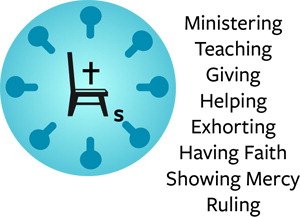 Every Christian possesses both natural talents and spiritual gifts. Our natural abilities come to us at physical birth and are developed through life. Our spiritual gifts are imparted by the Holy Spirit, enabling us to minister to others in behalf of Christ. Natural Gifts
Every Christian possesses both natural talents and spiritual gifts. Our natural abilities come to us at physical birth and are developed through life. Our spiritual gifts are imparted by the Holy Spirit, enabling us to minister to others in behalf of Christ. Natural Gifts
- What talents and natural abilities do you have? How did you acquire them , or improve upon them?
- According to I Corinthians 4:6-7 and Exodus 4:11, what should you attitude be about them?
- How would you apply Colossians 3:17 to the stewardship of your natural gifts?
- Major passages on spiritual gifts in the Bible are: Romans 12:3-8, I Corinthians 12:1-31, Ephesians 4:4-8,11-16, I Peter 4:10-11. From these passages make a complete list of spiritual gifts (combine any two that might be identical). Give your brief description of the gift. (You may wish to consult a Bible dictionary if you have one.)
- What are some reasons God has given gifted people to the church (Ephesians 4:11-16)?
- Why will two people not exercise the same gift in the same manner? (I Corinthians 12:4-6)
- Though some spiritual gifts seem to be of greater value than others (I Corinthians 12:28-31), what ideas does Paul stress to keep Christians from personal pride because of those they may possess? (Romans 12:4-5, I Corinthians 12:12-16, I Corinthians 13, Ephesians 4:11-16)
- List several principles that describe what your attitude and responsibilities should be toward your spiritual gifts. (Romans 12:3-8)
- Realize that you have at least one spiritual gift, probably more (Romans)
- Pray that God will make your gifts know to you
- Determine which of your activities the Lord seems to bless and inquire of other mature Christians who know you well what your spiritual gifts might be.
- List here what you believe your spiritual gifts are:
Stewardship of Our Possessions
One afternoon, Grandpa Clark strode into his house, pockets bulging with treats for his grandchildren. As he settled into his creaking rocker, the children clamored around him with expectant faces, each pushing and shoving to be the first to see what Grandpa had brought them. The gray-haired man dug deep into his pockets and pulled out a fistful of candy, handing each child a favorite treat. When he finished, he leaned back in his rocker with a smile of contentment to watch them tear at the wrappings. On his left, two jealous brothers argued over whose flavor of Lifesavers tasted better. Another child sat at his feet munching a candy bar. Suddenly, a tiny red-haired sweetheart patted her grandpa on the arm. Concern furrowed her brow. “Would you like some of my M&Ms, Grandpa?” she asked with sad, shy eyes. “You don’t have anything.” Grandpa Clark peered down at his only granddaughter and grinned. Gently, he gathered her dainty form into his lap. “Why, you haven’t even opened your candy,” he observed. She stared into his eyes with a frank expression. “Cause I want you to have the first one.” “Why, thank you, I think I will,” he smiled, carefully opening her little package. With relish, he removed a couple of colored candies and popped them into his mouth. Then he wrapped his arms tightly around her, engulfing her happy face. This story clearly illustrates tithing – giving back to God the first part of what He has given us. As you recall, the word tithe comes from a Greek term simply meaning the tenth. Godly principles underlay this practice. Tithing accomplishes the following:
“Would you like some of my M&Ms, Grandpa?” she asked with sad, shy eyes. “You don’t have anything.” Grandpa Clark peered down at his only granddaughter and grinned. Gently, he gathered her dainty form into his lap. “Why, you haven’t even opened your candy,” he observed. She stared into his eyes with a frank expression. “Cause I want you to have the first one.” “Why, thank you, I think I will,” he smiled, carefully opening her little package. With relish, he removed a couple of colored candies and popped them into his mouth. Then he wrapped his arms tightly around her, engulfing her happy face. This story clearly illustrates tithing – giving back to God the first part of what He has given us. As you recall, the word tithe comes from a Greek term simply meaning the tenth. Godly principles underlay this practice. Tithing accomplishes the following:
- Acknowledges God as the source and owner of all that we possess
- Is a voluntary act of worship
- Teaches us to put God first
- Is a practical guideline for systematic giving
- Provides spiritual release and blessing
- What did God command those under the Law of Moses to do? (Leviticus 27:30, Malachi 3:8-10)
- What would you say the “storehouse” is? (Deuteronomy 12:5,6,11)
- How much is a tithe? (Genesis 14:20, Hebrews 7:2)
- As believers in Christ, we are under grace rather than under the Old Testament Law. Whereas the Law in itself did not provide eternal life for those who attempted to keep it (Galatians 2:16), we have received life by the favor of God though we do not deserve it and could not possible earn it. Therefore, do we have a higher or lower motivation and standard for stewardship of our possessions than those under Law?
- How did Jesus regard a person’s responsibility in that area? (Matthew 23:23)
- Read II Corinthians 8-9. In this passage, Paul attempts to encourage the Corinthian church to give financially to help needy Christians. He first points them to the example of the Macedonian church. What was the attitude of the Macedonians in giving their money to God?
- In light of this, what do you think God is interested in? Why is giving money an important part of our Christian life? (II Corinthians 8:7, 9:12-13)
- In what sense does the one who sows sparingly reap sparingly? (II Corinthians 9:6) What kind of attitude does God want you to have in giving? (II Corinthians 9:7) When is it hard for you to give that way?
- Who is the great example of giving? (II Corinthians 8:9)
- In your own words, describe the last command Jesus gave to His disciples. (Matthew 28:19-20)
- Read John 14:21-24 . Describe how this relates to fulfilling the Great Commission.
- Oswald Smith said, “If you see ten men carrying a heavy log, nine of them on one end and one man struggling to carry the other, which end would most need help? The end with only one man. This illustrates how inequitably the evangelized nations have been using their resources to help fulfill the Great Commission. What percentage of your giving is going to overseas missions and home missions?
- Prayerfully consider what kind of adjustments you feel the Lord is leading you to make in your missions giving. Record it here.
- To whom do you and your possessions belong? (Psalm 50:12, I Corinthians 6:19-20)
- What should be your motive in the use of whatever you possess? (I Corinthians 10:31)
- What is your understanding about tithing? Describe your view in a short paragraph.
- What is the difference between giving and tithing? Which one describes your practice, and why?
- Ask yourself, “Is my heart attitude one of joy and gratitude as I give?” How do you express your attitude?
- List some Christian groups or churches that are working to fulfill the Great Commission (like Campus Crusade for Christ) in which you would like to invest financially.
Trusting God for Our Finances
Changing economic conditions exemplify the instability of finances throughout the world. Instead of placing their trust in the Lord who promised to meet all of their needs, most Christians trust in their investments, savings, and retirement plans to ensure security and happiness – only to find their hopes dashed when financial reverses deplete their assets. Many are wasting their lives trying to achieve financial security in a volatile world. Our heavenly Father, on the other hand, wants us to enjoy a full, abundant life free from the cares and stresses brought about by confidence in money and other material possessions. Rather than trusting in a worldly system that cannot assure our welfare or relying on our own weak capabilities to provide for our needs, He calls us to depend entirely on Him. Permit me to suggest a plan that will help you release your faith in God and develop your trust in Him for your finances.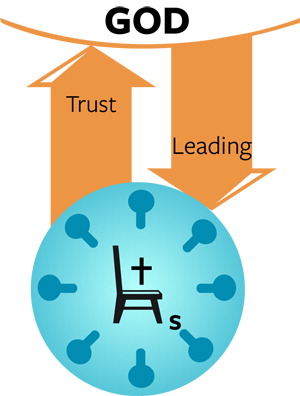 Recognize That God Is Worthy of Our Trust
Recognize That God Is Worthy of Our Trust
- Read Psalm 12:6. How much can we trust God?
- What will happen if you make God’s promises the foundation of your financial security (Proverbs 3:5-6)?
- List the financial areas that are hardest for you to put into God’s hands. Prayerfully dedicate them to Him.
- Read John 10:10. How does this promise apply to financial freedom?
- Does abundant life mean having all the money or possessions you want? Why or why not?
- Do you feel you have abundant life right now? If not, what is keeping you from it?
- How does fear interfere with your trust in God?
- Read 2 Timothy 1:7. Contrast the two kinds of spirits mentioned.
- Write down the financial areas that make you fearful. Surrender these to the Lord.
- What is the difference between needs and wants? Be specific.
- Why do we lack good things? (James 4:2-3, John 15:7)
- Faith requires action. According to 1 John 5:14-15, as an act of your will, ask God to supply your needs and expect Him, as an expression of your faith, to provide for your needs.
- What wrong motives do we sometimes display in prayer (James 4:3)? What is the result?
- Write down the wrong motives that you have. Then, confess them to God and claim the power of the Holy Spirit to help you rely on Him to supply your needs.
- What is essential to your Christian walk (Hebrews 11:6)?
- One way to enlarge your faith is to make a “faith promise” — one that is greater than you are capable of fulfilling according to your present income. It is not a pledge that must be paid. Rather, it is a voluntary “promise” based on your faith in God’s ability to supply out of His resources what you cannot give out of your own. You give as God supplies.
- Describe a time in which God led you to give above your means. What was the result?
- If you have never made a faith promise, you may want to do so now after prayerfully considering various worthwhile investments you can make for God. Keep a careful record of your giving and how God supplied your needs in a special way.
- Read Luke 6:38. How does this verse apply to financial freedom?
- Suppose a new Christian confides in you that he is afraid to give God control over his checkbook. How would you advise him?
- Review the steps to trusting God for your finances. Which of these steps are weak areas in your life? Why do you find them difficult? What could you do to strengthen them?
- Prayerfully consider a faith promise God would have you make. Write out that promise.
Our Accountability to God
Many Christians miss the special blessing of God because they do not obey our Lord’s command recorded in the Gospel of Matthew: “Don’t store up treasures here on earth where they can erode away or may be stolen. Store them in heaven where they will never lose their value, and are safe from thieves. If your profits are in heaven your heart will be there too” (Matthew 6:19-21, TLB). Jesus knew that by storing up treasures on earth, we would soon take on the appearance of the world. Through selfish desires, we would cease to reflect the character of God and seek our own glory. By laying up treasures in heaven, on the other hand, we would declare the glory of His kingdom.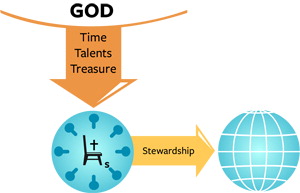 Everything we do to bring men and women into the kingdom of God, every act of kindness, every expression of love is laying up treasure in God’s storehouse. We give out of love for God and gratitude for His love and sacrifice for us through the gift of His only begotten Son, our Savior Jesus Christ. God will hold us accountable for our motivation in giving and for our faithful obedience to our Lord’s command to help fulfill the Great Commission and so reach the world for Christ. The apostle Paul wrote: We will all stand before God’s judgment seat. So then, each of us will give an account of himself to God (Romans 14:10,12). Relating the parable of the shrewd manager, Jesus said: There was a rich man whose manager was accused of wasting his possessions. So he called him in and asked him, “What is this I hear about you? Give an account of your management…” (Luke 16:1,2). God considers “An immortal soul beyond all price. There is no trouble too great, no humiliation too deep, no suffering too severe, no love too strong, no labor too hard, no expense too large, but that it is worth it, if it is spent in the effort to win a soul.” As faithful stewards, our primary financial responsibility is to help worthy ministries reach the largest possible number of people for Christ. We are accountable to our Lord’s last command before He ascended into heaven to “Go and make disciples of all nations” (Matthew 28:19). The Christian at Christ’s Coming
Everything we do to bring men and women into the kingdom of God, every act of kindness, every expression of love is laying up treasure in God’s storehouse. We give out of love for God and gratitude for His love and sacrifice for us through the gift of His only begotten Son, our Savior Jesus Christ. God will hold us accountable for our motivation in giving and for our faithful obedience to our Lord’s command to help fulfill the Great Commission and so reach the world for Christ. The apostle Paul wrote: We will all stand before God’s judgment seat. So then, each of us will give an account of himself to God (Romans 14:10,12). Relating the parable of the shrewd manager, Jesus said: There was a rich man whose manager was accused of wasting his possessions. So he called him in and asked him, “What is this I hear about you? Give an account of your management…” (Luke 16:1,2). God considers “An immortal soul beyond all price. There is no trouble too great, no humiliation too deep, no suffering too severe, no love too strong, no labor too hard, no expense too large, but that it is worth it, if it is spent in the effort to win a soul.” As faithful stewards, our primary financial responsibility is to help worthy ministries reach the largest possible number of people for Christ. We are accountable to our Lord’s last command before He ascended into heaven to “Go and make disciples of all nations” (Matthew 28:19). The Christian at Christ’s Coming
- According to II Corinthians 5:10, what will Christ do when He comes again? Notice that Paul says “we all.” Who is this primarily for?Note: Our sins have already been judged in Christ (Romans 8:1). The judgment here is of our works since the time we became a believer.
- Read I Corinthians 3:11-15. God’s judgment of our works is compared to the reaction of certain materials to fire. According to this passage, what is God most interested in regarding the works we do for Him?
- How is it then possible for us to spend long hours working for God, but have no reward whatsoever? A Christian’s works can be rejected, but what can he himself still be sure of? (Verse 15)
- The judgment of the Christian will take place when Christ comes again. When will that be? (Acts 1:6-7)
- On what should we concentrate until He comes? (Acts 1:8, Matthew 28:19-20, Mark 16:15)
- Why has Christ waited so long already before coming? (II Peter 3:9)
- Read Mark 13. This chapter foretells the world conditions as Christ’s coming approaches. As we see the world today becoming more like this, we know His coming is drawing near. What will we see happening in religion, from verses 5, 6, 21-22? What will the world situation be, in verses 7-8? What will occur in verse 8?
- Describe in your own words what you think Christ’s coming will be like from verses 26-27.
- As a believer, what are you to do as His coming draws near? (Mark 13:33)
- How will obedience to that instruction affect the following: Your employment; your social life; your worship; your giving?
- As faithful stewards of God’s resources, our primary responsibility is to help fulfill the Great Commission. If God were to call you into account for your stewardship, what would you say to Him? (Luke 16:1-2, Hebrews 4:13, I Peter 4:5)
- How can you be more faithful in your giving to help reach your world for Christ?
- In what ways are you storing up treasures in Heaven? Look over your spending in the past month. What percentage did you give to God’s work?
- To plan your giving for the next year, go through the chart on the following page to develop your personal Stewardship Plan.
- Begin by asking God how much and where He wants you to invest your time, talents, possessions, and money. Write your ideas here:
- Prayerfully develop a systematic plan for giving each month in each of these areas: Time, Talents, Possessions, Money.
- Plan to set aside some time and resources for needs you may become aware of at your church, in your neighborhood, or other places. Dedicate your plan to God. Ask Him to use your resources to bring the greatest glory to His name. Begin to implement your plan with a joyful heart, expecting God to bless you through your stewardship. Write any other notes and observations here:
Recap
The following questions will help you review this Step. If necessary, reread the appropriate lessons from your saved notes.- Define “Christian steward” in your own words. Why are we referred to as Christian stewards?
- Summarize your responsibilities as a steward of God as you now understand them.
- List several things over which you exercise stewardship. What is the most important thing for you to realize about your attitude toward stewardship?
- In which particular areas of your life have you seen a change for the better in your Christian stewardship?
Adapted from The 10 Basic Steps Toward Christian Maturity, by Bill Bright, co-founder of Campus Crusade for Christ. © Campus Crusade for Christ. All rights reserved.



